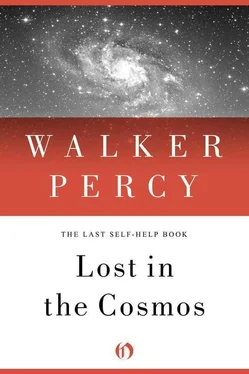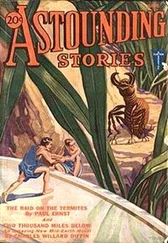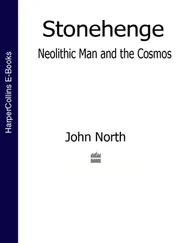Both Kierkegaard and modern semiotics give us leave to speak of the self as being informed—“possessed,” if you like, at certain historical stages of belief and unbelief. It becomes possible, whether one believes in God or not, soul or not, to agree that in an age in which the self is not informed by cosmological myths, by totemism, by belief in God — whether the God of Christianity, Judaism, or Islam — it must necessarily and by reason of its own semiotic nature be informed by something else.
Kierkegaard wrote of the relationship between Christianity and “the spirit of the erotic.” I wonder what he would have made of the influence of the technological revolution on the spirit of the erotic and whether it is a coincidence that this country is not only the most Christian and most eroticized of all societies but also the most technologically transformed and the most violent. Is there a relationship between the “spirit of the erotic,” technology, and violence?
At any rate, one may state the fact in Kierkegaardian terms without pretending to solve the riddle of the relationship:
The fact is that, by virtue of its peculiar relationship to the world, to others, and to its own organism, the autonomous self in a modern technological society is possessed. It is possessed by the spirit of the erotic and the secret love of violence.
The peculiar predicament of the present-day self surely came to pass as a consequence of the disappointment of the high expectations of the self as it entered the age of science and technology. Dazzled by the overwhelming credentials of science, the beauty and elegance of the scientific method, the triumph of modern medicine over physical ailments, and the technological transformation of the very world itself, the self finds itself in the end disappointed by the failure of science and technique in those very sectors of life which had been its main source of ordinary satisfaction in past ages.
As John Cheever said, the main emotion of the adult Northeastern American who has had all the advantages of wealth, education, and culture is disappointment.
Work is disappointing. In spite of all the talk about making work more creative and self-fulfilling, most people hate their jobs, and with good reason. Most work in modern technological societies is intolerably dull and repetitive.
Marriage and family life are disappointing. Even among defenders of traditional family values, e.g., Christians and Jews, a certain dreariness must be inferred, if only from the average time of TV viewing. Dreary as TV is, it is evidently not as dreary as Mom talking to Dad or the kids talking to either.
School is disappointing. If science is exciting and art is exhilarating, the schools and universities have achieved the not inconsiderable feat of rendering both dull. As every scientist and poet knows, one discovers both vocations in spite of, not because of, school. It takes years to recover from the stupor of being taught Shakespeare in English Lit and Wheatstone’s bridge in Physics.
Politics is disappointing. Most young people turn their backs on politics, not because of the lack of excitement of politics as it is practiced, but because of the shallowness, venality, and image-making as these are perceived through the media — one of technology’s greatest achievements.
The churches are disappointing, even for most believers. If Christ brings us new life, it is all the more remarkable that the church, the bearer of this good news, should be among the most dispirited institutions of the age. The alternatives to the institutional churches are even more grossly disappointing, from TV evangelists with their blown-dry hairdos to California cults led by prosperous gurus ignored in India but embraced in La Jolla.
Social life is disappointing. The very franticness of attempts to reestablish community and festival, by partying, by group, by club, by touristy Mardi Gras, is the best evidence of the loss of true community and festival and of the loneliness of self, stranded as it is as an unspeakable consciousness in a world from which it perceives itself as somehow estranged, stranded even within its own body, with which it sees no clear connection.
But there remains the one unquestioned benefit of science: the longer and healthier life made possible by modern medicine, the shorter work-hours made possible by technology, hence what is perceived as the one certain reward of the dreary life of home and the marketplace: recreation.
Recreation and good physical health appear to be the only unambivalent benefits of the technological revolution.
Five modes of recreation might be deduced from the semiotic which follows upon the placement of an autonomous unspeakable self in its world. The recreational modes of the autonomous self are understandable in terms of the semiotic options open to it, that is, those transactions with its world, itself, and other selves which are specified by its own placement in its world and its perception of itself as unspeakable.
They are:
Travel, the actual movement of the self in its world.
Sports, the disposing of oneself by contest and in team sports, the creation of a quasi community and territory, and the consequent identification of self with us against them.
Media, those transactions in which the self receives signs from other selves through a medium. Such a category can include sign-transactions as diverse as reading War and Peace, watching Dallas on TV, listening to The Grateful Dead on tape, hearing Dan Rather on the five-thirty news.
Drugs: the alteration of consciousness or the anesthetizing of the unspeakability of self.
Sex: the cheapest, most readily available and pleasurable mode of intercourse with our selves and the only mode of intercourse by which the self can be certain of its relationship with other selves — by touching and being touched, by giving and receiving pleasure, by penetrating or being penetrated.
Polarities of the “authentic” vs. the “inauthentic” are easily discernible in recreational modes. The criteria of authenticity are not necessarily objective but have rather to do with the rules by which the self allows or disallows its own experience.
For example, in travel, the actual movement of the self in the world to escape the expanding nought of the autonomous self at home, different selves will be disappointed or satisfied or delighted according as the trip falls short of, meets, or exceeds the expectation of the self. But the expectation of the self, to be informed in its nothingness — if only I can get out of this old place and into the new right place, I can become a new person — places a heavy burden on travel.
Three people take a bus tour of Mexico.
The bus breaks down and the tourists have to make an unscheduled stop, an old abandoned monastery converted to a questionable hotel by a questionable hotelier, like Ava Gardner in Night of the Iguana.
Traveler A is unhappy. She paid for certain accommodations and expects them. Things have gone awry. She makes everyone miserable with her complaints.
Traveler B is delighted. Having set great store by this trip, he is disappointed by its routineness, by Latinized Holiday Inns, by condo-rimmed beaches, by his boring fellow tourists. Now the unexpected happens. He feels he has left the beaten path. With satisfaction he surveys his new lodgings, a monk’s cell with adobe walls yea thick — he tells his friends later — and a single window overlooking a lush jungle. An adventure. What next?
Traveler C is neither happy nor unhappy. She knows all about standard bus tours of Mexico and she knows all about the unhappiness of Traveler A. But she also knows all about the happiness of Traveler B and the getting-off-the-beaten-path syndrome. In fact, she’s even heard of certain tours where “breakdowns” and “wrong turns” by wayward buses are prearranged. There are any number of converted monasteries in Mexico ministering to this new spiritual need. Yet she wants to make the tour, if only to get away and be let alone, and with minimal expectations. In fact, it is the very ordinariness of the tour and the ordinariness of the breakdown which she enjoys. She cultivates the routine as such. Rather than watch the picturesque Mexicans, she finds herself watching her fellow tourists watching the picturesque Mexicans. Joan Didion immortalized Traveler C.
Читать дальше












